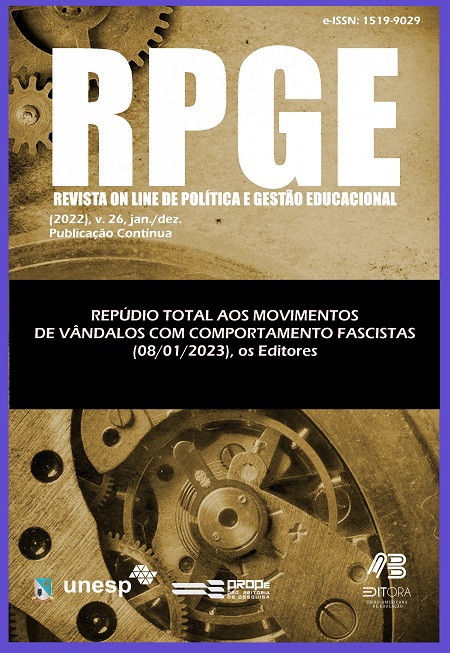Factores socio-psicológicos que afectan al desgaste profesional de los trabajadores sociales (basados en las experiencias de estudiantes y profesionales)
DOI:
https://doi.org/10.22633/rpge.v26i00.17335Palabras clave:
Social worker, Burnout, Stress, Professional activityResumen
El objetivo del artículo es establecer el nivel de agotamiento profesional y evaluarlo en el contexto de las características socioprofesionales de los trabajadores sociales en Rusia. Las características cuantitativas del problema estudiado se examinan mediante el método de encuesta en forma de cuestionarios y pruebas formalizadas. Los autores parten de la idea de que la profesión de trabajador social, que presupone el contacto directo con personas en situaciones vitales difíciles, es claramente una de las profesiones más propensas al desarrollo del síndrome de burnout profesional y es considerada por la sociedad como tal. El bajo nivel salarial combinado con la fuerte carga emocional son factores que contribuyen a la desorganización profesional del trabajador. Se constata que en las condiciones específicas de Rusia, las características generales de los trabajadores sociales presuponen no sólo el deseo de continuar la actividad profesional en la especialidad elegida, sino también un porcentaje relativamente bajo de personas, en las que se puede encontrar un alto grado de agotamiento professional.
Descargas
Citas
BOZEK, B.; RAEYMAECKERS, P.; SPOOREN, P. Motivations to become a master in social work: A typology of students. European Journal of Social Work, v. 20, n. 3, p. 409–421, 2017. Available in: https://www.tandfonline.com/doi/full/10.1080/13691457.2017.1283587. Access in: 19 Jan. 2022.
BRADLEY, J.; SUTHERLAND, V. Occupational stress in social services: A comparison of social workers and home help staff. British Journal of Social Work, v. 25, p. 313-331, 1995. Available in: https://academic.oup.com/bjsw/article-abstract/25/3/313/1665715. Access in: 17 Feb. 2022.
BURISCH, M. Das Burnout-Syndrom. Berlim: Springer-Verlag Berlin Heidelberg, 2014.
CHOMAEVA, G. A. Osobennosti i faktory vozniknoveniia sindroma “emotsionalnogo vygoraniia” u sotsialnykh rabotnikov [Specific features and factors of “emotional burnout” syndrome in social workers]. Problems of modern pedagogical education, n. 58-3, p. 365-368, 2018.
CHRISTIE, A.; KRUK, E. Choosing to become a social worker: Motives, incentives, concerns and disincentives. Social Work Education, v. 17, n. 1, p. 21–34, 1998. Available in: https://www.tandfonline.com/doi/abs/10.1080/02615479811220031. Access in: 10 Apr. 2022.
FISHER, E. A. Motivation and Leadership in Social Work Management: A Review of Theories and Related Studies. Administration in Social Work, v. 33, n. 4, p. 347–367, 2009. Available in: https://www.tandfonline.com/doi/full/10.1080/03643100902769160. Access in: 12 Feb. 2022.
FREUDENBERGER, H. J.; RICHELSON, G. Burn-Out. The High Cost of High Achievement. Garden City: Anchor Press, 1980.
GOMEZ-GARCIA, R.; ALONSO-SANGREGORIO, M.; LLAMAZARES-SANCHEZ, M. L. Burnout in social workers and socio-demographic factors. Journal of Social Work, v. 20, n. 4, p. 463–482, 2020. Available in: https://journals.sagepub.com/doi/abs/10.1177/1468017319837886?journalCode=jswa. Access in: 23 Dec. 2021.
GOMEZ-GARCIA, R.; BAYON-CALVO, S.; LUCAS-GARCIA, J. The Relationship between Burnout and Job Satisfaction in a Sample of Spanish Social Workers. British Journal of Social Work, v. 51, n. 8, p. 3115-3134, 2021. Available in: https://academic.oup.com/bjsw/article-abstract/51/8/3115/5907560?redirectedFrom=fulltext. Access in: 12 Apr. 2022.
HUSSEIN, S. Work engagement, burnout and personal accomplishments among social workers: A comparison between those working in children and adults’ services in England. Administration and Policy in Mental Health and Mental Health Services Research, v. 45, p. 911-923, 2018. Available in: https://link.springer.com/article/10.1007/s10488-018-0872-z. Access in: 10 June 2022.
IGLESIAS, M. E. L.; BENGOA, V. R. B. Prevalence and relationship between burnout, job satisfaction, stress, and clinical manifestations in Spanish critical care nurses. Dimensions of Critical Care Nursing, v. 32, p. 130–137, 2013. Available in: https://journals.lww.com/dccnjournal/Abstract/2013/05000/Prevalence_and_Relationship_Between_Burnout,_Job.10.aspx. Access in: 15 Feb. 2022.
JAHRAMI, H. et al. The relationship between burnout and job satisfaction among mental health workers in the psychiatric hospital, Bahrain. The Arab Journal of Psychiatry, v. 24, n. 1, p. 69–76, 2013. Available in: https://platform.almanhal.com/Reader/Article/22842. Access in: 23 Feb. 2022.
KIENKO, T. S. Organizatsionnye faktory professionalnogo vygoraniia sotsialnykh rabotnikov munitsipalnykh uchrezhdenii sotsialnogo obsluzhivaniia [Organizational factors of professional burnout among social workers of municipal social service institutions]. Perm University Herald. Series “Philosophy. Psychology. Sociology, v. 3, n. 27, p. 153-160, 2016.
KIM, H.; STONER, M. Burnout and turnover intention among social workers: Effects of role stress, job autonomy and social support. Administration in Social Work, v. 32, n. 3, p. 5-25, 2008. Available in: https://www.tandfonline.com/doi/full/10.1080/03643100801922357. Access in: 12 Apr. 2022.
LAUDERDALE, M. Burnout. Austin: Learning Concepts, 1981.
LIEDGREN, P. L.; ELVHAGE, G. V. Social work of the future: Motives and expectations among social work students in Sweden. International Journal of Social Science Studies, v. 3, n. 6, p. 121-129, 2015. Available in: https://redfame.com/journal/index.php/ijsss/article/view/1139. Access in: 19 Jan. 2022.
LIZANO, E. L. Examining the impact of job burnout on the health and well-being of human service workers: A systematic review and synthesis. Human Service Organizations: Management, Leadership & Governance, v. 39, n. 3, p. 167-181, 2015. Available in: https://www.tandfonline.com/doi/full/10.1080/23303131.2015.1014122. Access in: 13 July 2022.
LLOYD, C.; KING, R.; CHENOWETH, L. Social work, stress and burnout: A review. Journal of Mental Health, v. 11, n. 3, p. 255-265, 2011. Available in: https://www.researchgate.net/publication/29464897_Social_Work_stress_and_burnout_A_review. Access in: 23 Dec. 2021.
MAHER, E. A. Burnout and commitment: A theoretical alternative. Personnel and Guidance Journal, v. 61, p. 390-393, 1983. Available in: https://psycnet.apa.org/record/1983-24540-001. Access in: 17 Aug. 2021.
MASLACH, C. Burnout, Psychology of. In: WRIGHT, J. D. (ed.). International Encyclopedia of the Social & Behavioral Sciences. Amsterdã: Elsevier Science, 2015.
MASLACH, C.; JACKSON, S. E. Maslach Burnout Inventory: Second Edition. Palo Alto: Consulting Psychologists Press, 1986.
MASLACH, C.; LEITER, M. P. The truth about burnout. How organizations cause personal stress and what to do about It. San Francisco: Jossey-Bass, 1997.
MORSE, G. et al. Burnout in mental health services: A review of the problem and its remediation. Administration and Policy in Mental Health and Mental Health Services Research, v. 39, n. 5, p. 341-352, 2012. Available in: https://www.ncbi.nlm.nih.gov/pmc/articles/PMC3156844/. Access in: 15 Dec. 2021.
POULSEN, I. Burnoutprävention im Berufsfeld Soziale Arbeit. Perspektiven zur Selbstfürsorge von Fachkräften. Wiesbaden: VS Verlag für Sozialwissenschaften, 2009.
RABOCHAIA, S. zaniatost i bezrabotitsa v Rossii (po rezultatam vyborochnykh obsledovanii rabochei sily). 2020 Statisticheskii sbornik [Labor Force, Employment and Unemployment in Russia (based on the results of sample labor force surveys). 2020 Statistical Digest]. Moscow, 2020.
RACKAUSKIENE, S.; KASNAUSKIENE, J.; VIRBALIENĖ, A. The social workers intrinsic and extrinsic motives to work social work. International Journal of Psychology and Behavioral Sciences, v. 3, n. 3, p. 63–69, 2013. Available in: http://article.sapub.org/10.5923.j.ijpbs.20130303.01.html. Access in: 23 Dec. 2021.
SAVAYA, R.; LEVIN, L.; ROZINER, I. Social workers in Israel: Daily stressors, work benefits, burnout and well-being. The British Journal of Social Work, v. 51, n. 1, p. 318-339, 2021. Available in: https://academic.oup.com/bjsw/article-abstract/51/1/318/5880255?redirectedFrom=fulltext. Access in: 10 Apr. 2022.
SCHAUFELI, W. B.; DIERENDONCK, D. A cautionary note about the crossnational and clinical validity of cut-off points for the Maslach Burnout Inventory. Psychological Reports, v. 76, p. 1083–1090, 1995. Available in: https://journals.sagepub.com/doi/10.2466/pr0.1995.76.3c.1083. Access in: 15 Apr. 2022.
SIEGRIST, J. Adverse health effects of high effort – low reward conditions. Journal of Occupational Health Psychology, v. 1, p. 27-41, 1996. Available in: https://pubmed.ncbi.nlm.nih.gov/9547031/. Access in: 23 Dec. 2021.
TRAVIS, D. J.; LIZANO, E. L.; BARAK, M. E. ‘I'm So Stressed!’: A Longitudinal Model of Stress, Burnout and Engagement among Social Workers in Child Welfare Settings. The British Journal of Social Work, v. 46, n. 4, p. 1076-1095, 2016. Available in: https://www.ncbi.nlm.nih.gov/pmc/articles/PMC4986087/. Access in: 23 Dec. 2021.
VODOPIANOVA, N. E.; STARCHENKOVA, E. S. Sindrom vygoraniia: Diagnostika i profilaktika. [Burnout syndrome: diagnosis and prevention.]. Saint Petersburg: “Piter”, 2005.
VODOPIANOVA, N. E.; STARCHENKOVA, E. S.; NASLEDOV, A. D. Standartizirovannyi oprosnik “professionalnoe vygoranie” dlia spetsialistov sotsionomicheskikh professii [Standardized questionnaire “professional burnout” for specialists in socionomic professions]. Vestnik of St. Petersburg State University. Series 12. Psychology. Sociology. Pedagogy, v. 4, p. 17-27, 2013.
Descargas
Publicado
Cómo citar
Número
Sección
Licencia
Derechos de autor 2022 Revista on line de Política e Gestão Educacional

Esta obra está bajo una licencia internacional Creative Commons Atribución-NoComercial-CompartirIgual 4.0.
Manuscritos aceitos e publicados são de propriedade da Revista on line de Política e Gestão Educacional. É vedada a submissão integral ou parcial do manuscrito a qualquer outro periódico. A responsabilidade do conteúdo dos artigos é exclusiva dos autores. É vedada a tradução para outro idioma sem a autorização escrita do Editor ouvida a Comissão Editorial Científica.











